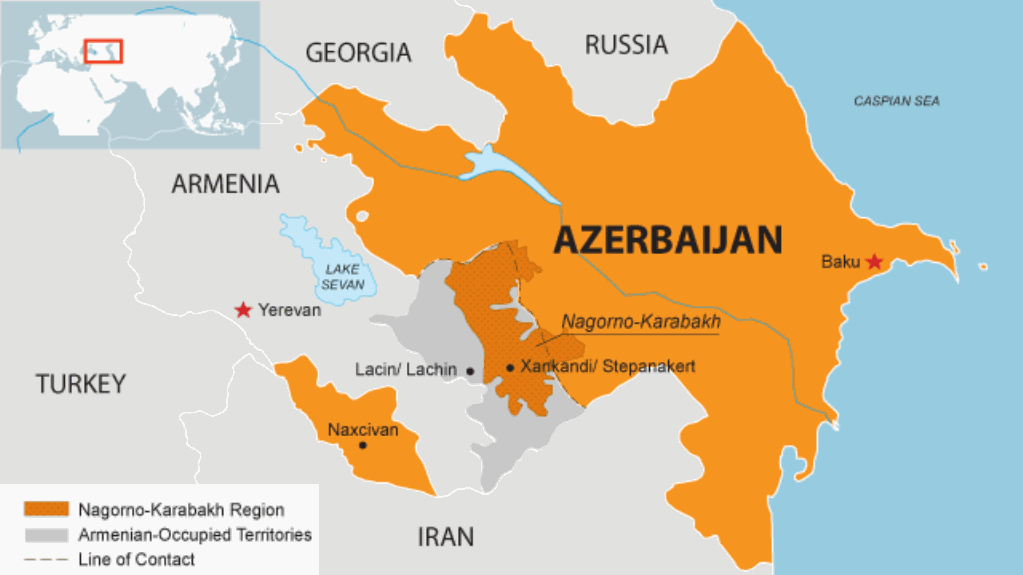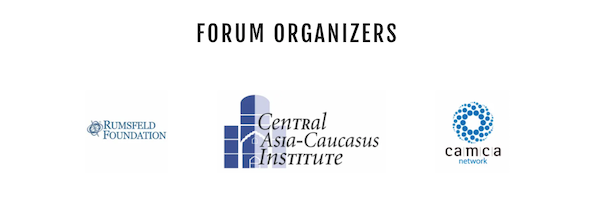Can America Stop a Wider War between Armenia and Azerbaijan?

Resources on the Armenia-Azerbaijan Conflict
Resources on the Armenia-Azerbaijan Conflict
The Central Asia-Caucasus Institute & Silk Road Studies Program have a long track record of covering the Armenia-Azerbaijan Conflict. This page presents the key resources and most recent analysis.
In 2017, Palgrave published the first book-length study of the International Politics of the Armenia-Azerbaijan Conflict, edited by Svante Cornell. The book concluded by arguing that if international efforts to resolve the conflict are not stepped up, “the ‘four-day’ war of April 2016 will appear a minor skirmish compared to what is sure to follow”.
In 2015, CACI & SRSP released the Silk Road Paper “A Western Strategy for the South Caucasus”, which included a full page of recommendations for the U.S. and EU on the Armenia-Azerbaijan conflict. These are reproduced below:
------------------
Develop a substantial and prolonged Western initiative on the Armenian-Azerbaijani conflict.
o This initiative must be led by the United States, in close consultation with its European partners – primarily the EU Commission and External Action Service, and France. Barring some process to reinvigorate the Minsk Process – a doubtful proposition given Western-Russian relations in the foreseeable future – Western leaders must be prepared to bypass that process, utilizing it where appropriate but focusing their initiative on developing direct negotiations between the Armenian and Azerbaijani leaders.
o The U.S. and its European partners must abandon the practice of relying solely on the Minsk Group co-chairs to resolve the Karabakh conflict. These diplomats have contributed greatly to formulating a workable framework agreement. However, strong and sustained U.S. Government leadership from the top level is needed to complement or, failing that, to replace the Minsk Process. In practice, this means the expressed support of the President, involvement of the White House, and leadership manifested in the appointment of a distinguished citizen as Special Envoy for the resolution of the conflict.
o The EU must take a more clearly defined and substantial role in the process, by integrating to the highest degree possible the French co-chairmanship of the Minsk Group with EU institutions. While Washington will need to take the lead on the political side, it would be natural for the EU to take the lead in organizing an international development program for the currently occupied Azerbaijani provinces and Karabakh itself. That effort, too, would need to be led by a senior EU figure.
--------------------------------------------
In 2011, CACI & SRSP helped launch an extensive study of the steps needed for the post-conflict rehabilitation of Azerbaijan's occupied territories, in cooperation with Eldar Ismailov and Nazim Muzaffarli of the Institute for Strategic Studies of the Caucasus. The monograph "Basic Principles for the Rehabilitation of Azerbaijan's Post-Conflict Territories" can be accessed here.
More background resources:
Svante E. Cornell, "Can America Stop a Wider War Between Armenia and Azerbaijan?", The National Interest, October 2020
Brenda Shaffer and Svante E. Cornell, Occupied Elsewhere: Selective Policies on Occupation, Foundation For Defense of Democracies, January 2020.
Brenda Shaffer and Svante E. Cornell, "The U.S. Needs to Declare War on Proxies", Foreign Policy, January 27, 2020
Svante E. Cornell, “The Raucous Caucasus”, American Interest, May 2017
Svante E. Cornell, Small Nations and Great Powers: A Study of Ethnopolitical Conflict in the Caucasus, RoutledgeCurzon, 2001.
Svante E. Cornell, The Nagorno-Karabakh Conflict, Uppsala University, 1999
More recent analysis:
“Turkey Seeks to Counter Russia in the Black Sea-Caucasus Region,” Turkey Analyst, 10/5/20, Emil Avdaliani
“Turkey’s Commitment to Azerbaijan’s Defense Shows the Limits of Ankara’s Tilt to Moscow,” Turkey Analyst, 9/25/20, Turan Suleymanov & Bahruz Babayev
“Cross-Border Escalation between Armenia and Azerbaijan,” Central Asia-Caucasus Analyst, 9/25/20, Natalia Konarzewska
“Russia and Turkey: Behind the Armenia-Azerbaijan Clashes?”, Central Asia-Caucasus Analyst, 8/31/20, Avinoam Idan
“Armenia and the U.S.: Time for New Thinking?”, Central Asia-Caucasus Analyst, 10/2/19, Eduard Abrahamyan.
“Why Washington Must Re-Engage the Caucasus” Central Asia-Caucasus Analyst, 7/8/19, Stephen Blank
“Azerbaijan’s Defense Industry Reform”, Central Asia-Caucasus Analyst, 5/7/19, Tamerlan Vahabov.
“Military Procurements on Armenia's and Azerbaijan's Defense Agendas”, Central Asia-Caucasus Analyst, 3/27/19, Ilgar Gurbanov
“Armenia's New Government Struggles with Domestic and External Opposition,” Central Asia-Caucasus Analyst, 3/20/19, Armen Grigorian.
“Bolton's Caucasian Tour and Russia's Reaction”, Central Asia-Caucasus Analyst, 12/17/18, Eduard Abrahamyan.
CACI and the Rumsfeld Foundation hosted e-CAMCA Week 2020
In lieu of our in-person annual gathering, the CAMCA Regional Forum organizers are hosting a virtual e-CAMCA Week.
The June 2020 CAMCA Forum, to be held in Almaty, Kazakhstan, was postponed until June 2021. In its place, CACI and the Rumsfeld Foundation organized the e-CAMCA week of online events and publication. Find recordings of the e-CAMCA Week virtual events held over June 15th-19th at the CAMCA Forum YouTube Channel, as well a variety of original #CAMCAweek publications and resources for our CAMCA Forum community at www.camcaforum.org,.


E-CAMCA WEEK PUBLICATIONS
Welcome Letter
Letter from Secretary Donald Rumsfeld
e-CAMCA Week 2020 participants
Meet CAMCA Entrepreneurs
View features of some successful regional entrepreneurs from our CAMCA Network
"Caucasus & Central Asia Post COVID-19" Series- Volume I
Digital Transformation in the CAMCA Region
Post COVID-19: Challeges & Opportunities for the Region

e-CAMCA Week 2020
In lieu of our in-person annual gathering, the CAMCA Regional Forum organizers are hosting a virtual e-CAMCA Week.
From June 15th-19th we will be hosting a daily live speaker session or panel, as well as releasing a variety of original content and helpful resources, for our CAMCA Forum community. We’ve pulled together a terrific collection of experts from across sectors, including members of the CAMCA Network, that will be delivering the latest on what you need to know about the region during the COVID-19 crisis and beyond.
Live video events will take place at 10 AM EST daily from June 16th-19th .
TUNE IN HERE to our Facebook page for live video events (full agenda below) and
SUBSCRIBE BELOW to receive the aforementioned release
VIEW THE FULL AGENDA DETAILS HERE


E-CAMCA WEEK PUBLICATIONS
Welcome Letter
Letter from Secretary Donald Rumsfeld
e-CAMCA Week 2020 participants
Meet CAMCA Entrepreneurs
View features of some successful regional entrepreneurs from our CAMCA Network
"Caucasus & Central Asia Post COVID-19" Series- Volume I
Digital Transformation in the CAMCA Region
Post COVID-19: Challeges & Opportunities for the Region

CACI and CSIS Forum: Azerbaijan in a Changing Caucasus: Developments in Foreign and Domestic Policies
Azerbaijan in a Changing Caucasus: Developments in Foreign and Domestic Policies
Azerbaijan has recently embarked on a series of reforms to modernize the country’s economic and social policies. In foreign relations, Azerbaijan is in the final stages of negotiating an enhanced cooperation agreement with the European Union, and continues to work toward the realization of the Southern Gas Corridor. Increased diplomatic activity has intensified expectations surrounding the conflict in Nagorno-Karabakh, while U.S. National Security Advisor John Bolton's visit to the South Caucasus in October also suggests growing U.S. engagement. The American Foreign Policy Council's Central Asia-Caucasus Institute and the Center for Strategic & International Studies held a discussion with three senior Azerbaijani parliamentarians, who provided an update on developments in Azerbaijan and the region.
Speakers:
Mr. Samad Seyidov – Chairman of the Committee on Foreign and Interparliamentary Relations of Parliament, Head of Azerbaijan-USA working group on interparliamentary relations
Ms. Sahiba Gafarova – Member of the Committee on Foreign and Interparliamentary Relations of Parliament
Mr. Asim Mollazada – Member of the Committee on Foreign and Interparliamentary Relations of Parliament
Introduction: Svante Cornell, Director, Central Asia-Caucasus Institute
Moderator: Jeff Mankoff, Deputy Director, Russia & Eurasia Program, CSIS
Where: Center for Strategic and Intenational Studies: 1616 Rhode Island Avenue NW, Concourse Level, Washington, DC 20036
When: Friday, March 29, 2019 from 12:00 - 1:30 pm



